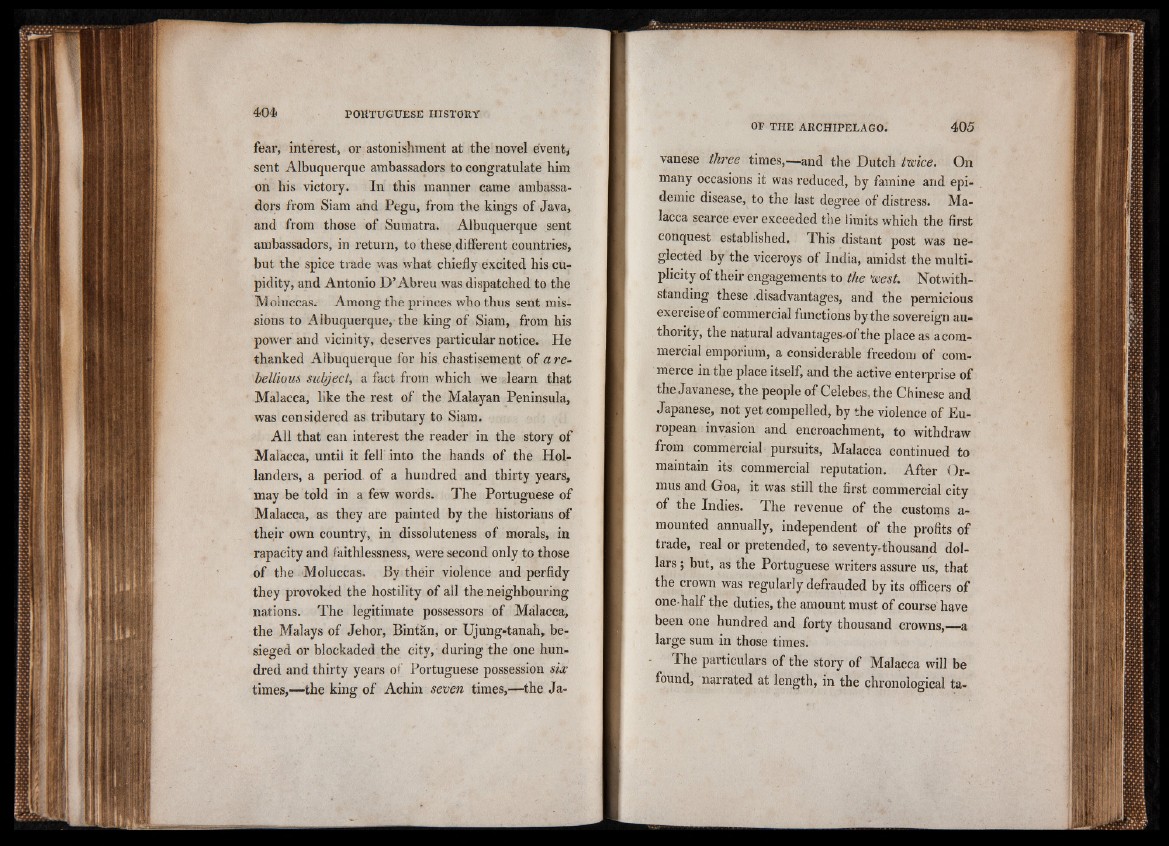
fear, interest, or astonishment at the novel event,
sent Albuquerque ambassadors to congratulate him
on his victory. In this manner came ambassadors
from Siam and Pegu, from the kings of Java,
and from those of Sumatra. Albuquerque sent
ambassadors, in return, to these, different countries,
but the spice trade was what chiefly excited his cupidity,
and Antonio D’ Abreu was dispatched to the
Moluccas. Among the princes who thus sent missions
to Albuquerque, the king of Siam, from his
power and vicinity, deserves particular notice. He
thanked Albuquerque for his chastisement of a rebellious
subject, a fact from which we learn that
Malacca, like the rest of the Malayan Peninsula,
was considered as tributary to Siam.
All that can interest the reader in the story of
Malacca, until it fell into the hands of the Hollanders,
a period of a hundred and thirty years,
may be told in a few words. The Portuguese of
Malacca, as they are painted by the historians of
the.ir own country, in dissoluteness of morals, in
rapacity and faithlessness, were second only to those
of the Moluccas. By their violence and perfidy
they provoked the hostility of all the neighbouring
nations. The legitimate possessors of Malacca,
the Malays of Jehor, Bintan, or Ujung-tanah, besieged
or blockaded the city, during the one hundred
and thirty years of Portuguese possession six
times,—the king of Achin seven times,—the Javanese
three times,—and the Dutch twice. On
many occasions it was reduced, by famine and epidemic
disease, to the last degree of distress. Malacca
scarce ever exceeded the limits which the first
conquest established. This distant post was neglected
by the viceroys of India, amidst the multiplicity
of their engagements to the west. Notwithstanding
these disadvantages, and the pernicious
exercise of commercial functions by the sovereign authority,
the natural advantages^of the place as acom-
mercial emporium, a considerable freedom of commerce
in the place itself, and the active enterprise of
the Javanese, the people of Celebes, the Chinese and
Japanese, not yet compelled, by the violence of European
invasion and encroachment, to withdraw
from commercial pursuits, Malacca continued to
maintain its commercial reputation. After Or-
mus and Goa, it was still the first commercial city
of the Indies. The revenue of the customs a-
mounted annually, independent of the profits of
trade, real or pretended, to seventy-thousand dollars
; but, as the Portuguese writers assure us, that
the crown was regularly defrauded by its officers of
one-half the duties, the amount must of course have
been one hundred and forty thousand crowns,—-a
large sum in those times.
The particulars of the story of Malacca will be
found, narrated at length, in the chronological ta